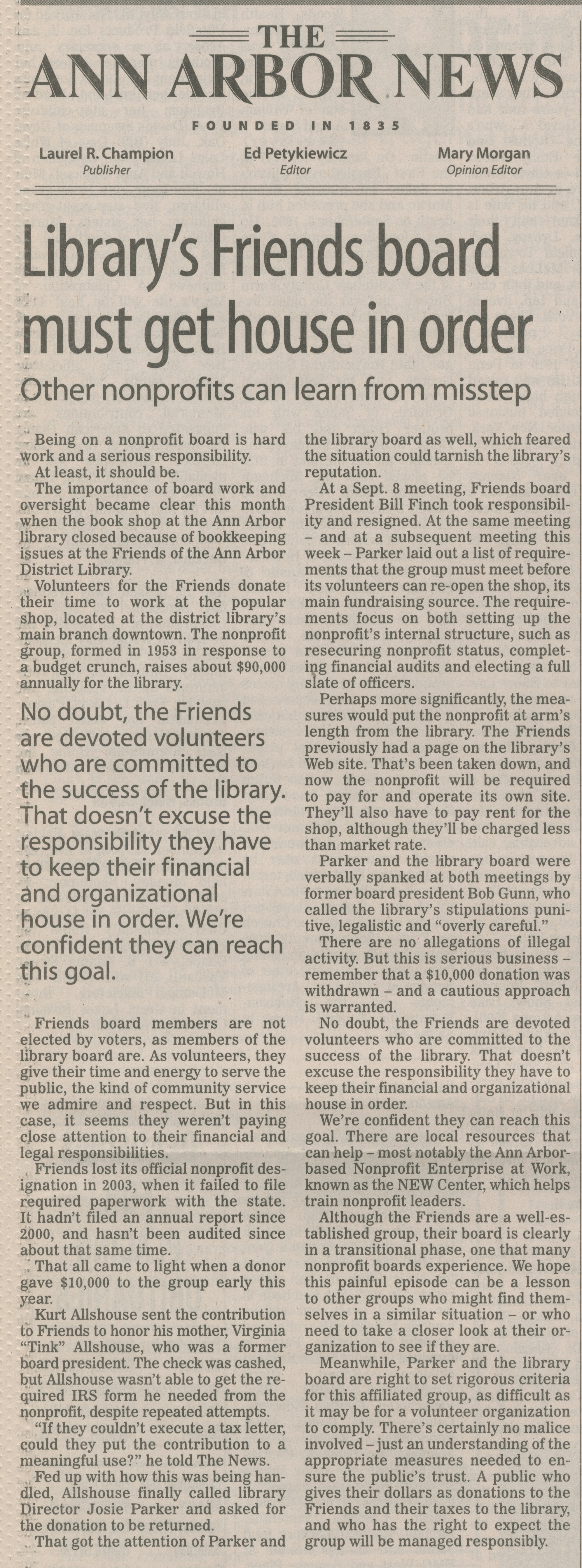Library's Friends Board Must Get House In Order

ANN ARBOR NEWS
FOUNDED IN 1835
Laurel R. Champion | Publisher
Ed Petykiewicz | Editor
Mary Morgan | Opinion Editor
Library's Friends board must get house in order
Other nonprofits can learn from misstep
Being on a nonprofit board is hard work and a serious responsibility.
At least, it should be.
The importance of board work and oversight became clear this month when the book shop at the Ann Arbor library closed because of bookkeeping issues at the Friends of the Ann Arbor District Library.
Volunteers for the Friends donate their time to work at the popular shop, located at the district library’s main branch downtown. The nonprofit group, formed in 1953 in response to a budget crunch, raises about $90,000 annually for the library.
Friends board members are not elected by voters, as members of the library board are. As volunteers, they give their time and energy to serve the public, the kind of community service we admire and respect. But in this case, it seems they weren’t paying close attention to their financial and legal responsibilities.
Friends lost its official nonprofit designation in 2003, when it failed to file required paperwork with the state. It hadn’t filed an annual report since 2000, and hasn’t been audited since about that same time.
That all came to light when a donor gave $10,000 to the group early this year.
Kurt Allshouse sent the contribution to Friends to honor his mother, Virginia “Tink” Allshouse, who was a former board president. The check was cashed, but Allshouse wasn’t able to get the required IRS form he needed from the nonprofit, despite repeated attempts.
“If they couldn’t execute a tax letter, could they put the contribution to a meaningful use?” he told The News.
Fed up with how this was being handled, Allshouse finally called library Director Josie Parker and asked for the donation to be returned.
That got the attention of Parker and the library board as well, which feared the situation could tarnish the library’s reputation.
At a Sept. 8 meeting, Friends board President Bill Finch took responsibility and resigned. At the same meeting - and at a subsequent meeting this week - Parker laid out a list of requirements that the group must meet before its volunteers can re-open the shop, its main fundraising source. The requirements focus on both setting up the nonprofit’s internal structure, such as resecuring nonprofit status, completing financial audits and electing a full slate of officers.
Perhaps more significantly, the measures would put the nonprofit at arm’s length from the library. The Friends previously had a page on the library’s Web site. That’s been taken down, and now the nonprofit will be required to pay for and operate its own site. They’ll also have to pay rent for the shop, although they’ll be charged less than market rate.
Parker and the library board were verbally spanked at both meetings by former board president Bob Gunn, who called the library’s stipulations punitive, legalistic and “overly careful.”
There are no allegations of illegal activity. But this is serious business -remember that a $10,000 donation was withdrawn - and a cautious approach is warranted.
No doubt, the Friends are devoted volunteers who are committed to the success of the library. That doesn’t excuse the responsibility they have to keep their financial and organizational house in order.
We’re confident they can reach this goal. There are local resources that can help - most notably the Ann Arbor-based Nonprofit Enterprise at Work, known as the NEW Center, which helps train nonprofit leaders.
Although the Friends are a well-established group, their board is clearly in a transitional phase, one that many nonprofit boards experience. We hope this painful episode can be a lesson to other groups who might find themselves in a similar situation - or who need to take a closer look at their organization to see if they are.
Meanwhile, Parker and the library board are right to set rigorous criteria for this affiliated group, as difficult as it may be for a volunteer organization to comply. There’s certainly no malice involved - just an understanding of the appropriate measures needed to ensure the public’s trust. A public who gives their dollars as donations to the Friends and their taxes to the library, and who has the right to expect the group will be managed responsibly.
Article
Subjects
Internal Revenue Service (IRS)
Volunteers & Volunteering
Nonprofits
Nonprofit Enterprise at Work
New Center
Fundraisers
Friends of the Ann Arbor District Library
Editorials
Ann Arbor District Library - Board of Trustees
Ann Arbor District Library
Editorial
Old News
Ann Arbor News
Tink Allshouse
Kurt Allshouse
Josie Barnes Parker
Bob Gunn
Bill Finch
343 S Fifth Ave